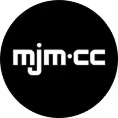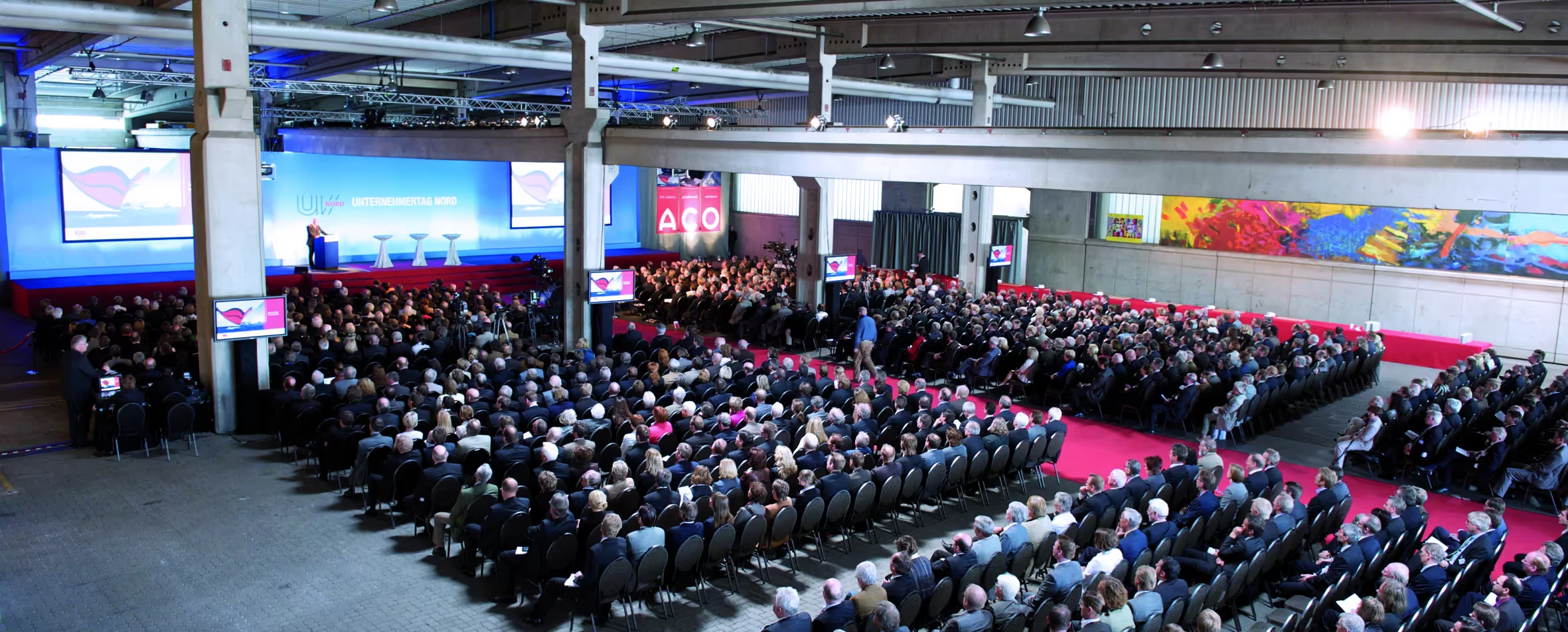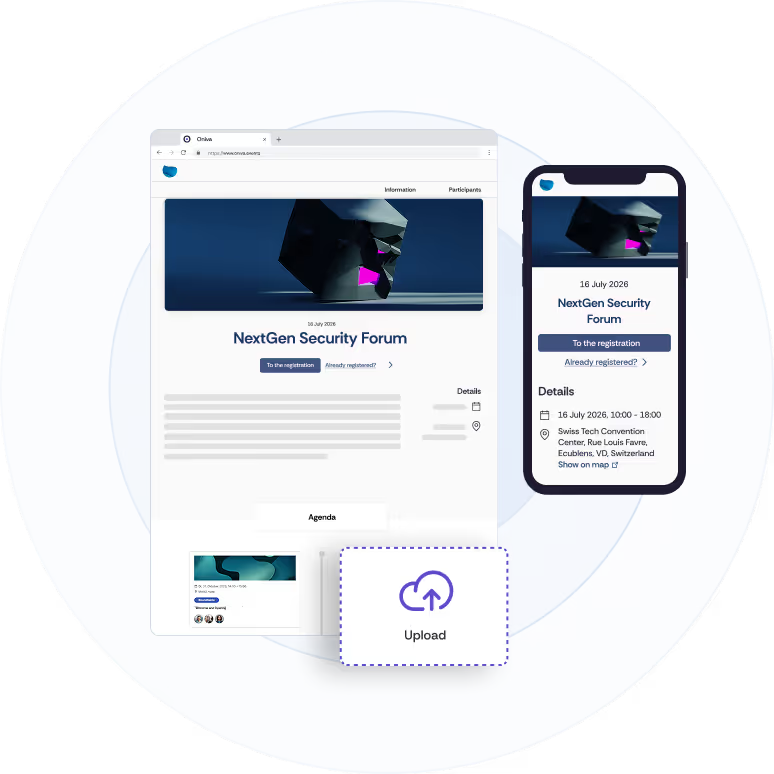What Is a content management system?
A CMS is software that allows you to manage the content (text, images, media) of a website. It typically offers a user-friendly interface (WYSIWYG, drag & drop), various page types, templates, plugins/extensions, and features such as user management, roles, or a media library.
Typical CMSs include WordPress, Drupal, Joomla, Shopify (for e-commerce), and Typo3.
Many organisations already use a CMS. It therefore seems obvious to use it for creating event pages and handling registrations.
When is a CMS used for events?
A typical scenario looks like this: you create an event landing page on your website where visitors can find all key information such as date, location, agenda, and perhaps a few words about the speakers. To allow participants to register, you embed a form – often via a CMS plugin or an external provider. Interested individuals enter their contact details, and you receive a notification by email or can access the entries via the backend.
For small events with a manageable number of participants (around 50 guests), this approach can work well, especially if the registration process is simple and no complex logic is required. However, as soon as you plan for more registrations, multiple booking options, or automated communication steps, this setup quickly reaches its limits.
What are the possibilities of using a CMS for event registrations?
Das eigene CMS für Event-Anmeldungen zu nutzen bringt gewisse Vorteile. Wenn du dein bestehendes CMS zur Eventregistrierung einsetzt erreichst du:
Using your own CMS for event registrations offers certain advantages:
1. Low additional costs
If your CMS is already in place, there are no major investments required for additional software or licence fees.
2. Integrated user journey
Your visitors remain on your website, view your content, and navigate seamlessly between event and other pages.
3. Visibility & SEO
You benefit from your existing domain, SEO strategy, and rankings. The event page can also be directly integrated into your site structure.
4. Basic data management
Registration data can be exported (e.g. as CSV) and imported into other systems such as newsletter tools or CRMs.
These advantages make a CMS a quick and pragmatic solution for small and simple events. However, as events become larger or more complex, this approach soon hits its limits.
What are the limitations of a CMS for event registrations?
Anyone who has organised larger or more complex events knows the weaknesses of a CMS and the challenges that come with it. To manage events efficiently and automatically, a specialised event management tool is essential. The most common weaknesses of CMSs are:
No management of capacities or attendance limits
If your event allows only 250 attendees but more try to register, there’s no automatic closure or waiting list mechanism.
Lack of registration logic
Complex conditions such as “If A is selected, then B is required” or dynamic forms are often not possible.
Limited payment functionality
Payments (credit card, invoice, payment processing) are often not integrated or require cumbersome workarounds.
No access control for closed events
You can hardly control who can participate (e.g. exclusive B2B events, customers, or partners). Website access restrictions are usually very limited.
Limited contact and guest management
You get a list of registered guests, but no clear status per contact or visibility of invitation history. The lack of segmentation makes participant management cumbersome.
Weak reporting and analytics
A CMS does not provide comprehensive analytics for your event. There are no metrics such as registration or no-show rates. The lack of reporting means you cannot improve your events based on data.
No e-tickets or QR codes
Tracking event entry is an important factor in measuring event success. Without an integrated event check-in solution, access control cannot be automated.
Missing interaction features
Dynamic functions for specific event interactions, such as displaying guest lists, chats, or networking, are generally not available.
No personalised experience
Personalised event links or customised registration forms for different target groups are hardly achievable with standard solutions.
Lack of communication (emails, reminders, confirmations)
Many CMSs do not offer integrated workflows for automated event communication such as invitations, reminders, or follow-ups.
Scalability issues
As the number of participants increases or events become more complex (e.g. with parallel tracks or workshops), a CMS can quickly become unstable or difficult to manage.
These numerous limitations make it clear: a CMS can only support event organisation up to a certain level of complexity and for smaller events.
Disadvantages for event marketing when using a CMS
Using a CMS for events brings several limitations that directly impact the successful execution of event marketing.
No personalisation
A CMS offers little ability to tailor content or registration processes to individual participants. You can’t send personalised invitations or use dynamic forms that adapt to specific audiences or interests. As a result, your event marketing remains generic and loses relevance for individual customer segments.
Lack of automation
Many processes in a CMS must be handled manually – confirming registrations, sending reminders, processing cancellations. Automated workflows that update participant data in the background or trigger emails based on certain actions are usually missing. This costs time and makes your event marketing more labour-intensive and less scalable.
Limited control
With a CMS, you have little transparency about who has registered, attended, or cancelled. Tracking status changes or coordinating between different event phases is difficult. This lack of control makes it hard to manage marketing activities effectively or measure campaign success.
Error-prone processes
Because many tasks are manual, the risk of mistakes increases. Duplicate entries, incorrect data, or missed cancellations are common problems. Without automated validation or synchronisation with other systems, data quality suffers — and with it, the basis for reliable decision-making.
Limited analytics
A CMS rarely provides detailed analyses of registrations, attendance rates, or engagement. It’s difficult to identify which channels convert best or how guest behaviour evolves across multiple events. Without these insights, you lack the foundation to strategically optimise your event marketing.
Advantages of an event management tool compared to a CMS
An event management tool (or event management software) addresses the challenges of professional event management and is specifically designed for them. Here are the key advantages:
1. Simplified guest management
You can import guest data and view the current status of each contact at any time. This forms the foundation for professional participant management, giving you full visibility of your event capacity.
2. Automated workflows and communication
Invitations, reminders, follow-ups, and notifications can be sent automatically with personalised content directly from the tool.
3. Flexible registration logic
Flexible registration rules allow you to fully automate and simplify event sign-ups, including capacity limits, automated waiting lists, or varying numbers of accompanying guests per group.
4. Automated payment processing
For paid events, integrated payment providers handle ticket transactions automatically. Early-bird pricing or discount codes can be used to manage demand flexibly.
5. Real-time analytics and reporting
Event management tools typically include a dashboard displaying metrics such as registration numbers and no-show rates. This allows you to track event success in real time and make targeted planning decisions.
6. Interactive features and enhanced event experience
The tool provides features to boost engagement, such as networking functions, live chat, or automated matchmaking, increasing the event’s attractiveness and adding real value.
7. Agenda and session management
Agendas and individual sessions can be dynamically customised for different audience segments, offering a personalised event experience.
8. Check-in and access control
Integrated check-in solutions ensure smooth and fast entry. Combined with badge printing, this increases efficiency and reduces waiting times.
9. CRM integration
Modern event software can connect via interfaces to existing CRM systems, automatically synchronising data and eliminating duplicate work.
10. Scalability and performance
High-demand B2B events often experience a surge at go-live. Event management tools are built to maintain performance and stability even with hundreds or thousands of participants.
These points demonstrate that a good event management tool simplifies a large part of event organisation and provides the essential data foundation to continuously improve event marketing, ultimately generating greater business value for the organisation.
Combining a CMS with an event management tool
There are cases where a CMS remains indispensable for events, particularly when high flexibility in website design is required or when the user journey needs to occur on a specific page of the organisation’s website. For example, a conference may operate a year-round website to build a community, with the main event as the highlight. In such cases, combining a CMS with an event management tool is recommended.
Simple linking
Use your CMS for content (blogs, SEO, marketing pages) and add a “Register now” link to the event registration page in the event management tool. The tool then handles all other event processes, including registration, confirmations, reminders, check-in, and reporting. This is the simplest combination with minimal technical effort, though users will leave the CMS when registering.
Embedded solution
Implement the registration form as an embedded solution, for example via an iFrame or plugin, so participants remain on your domain without disruption. This approach is useful if the event management tool only handles registration logic and no further interactions are planned.
API integration
Integrate elements such as event calendars, event details, or guest lists directly into your website via an API. Flexible interfaces allow you to use the event management tool’s features and display them as needed. This approach is technically complex and requires specialised expertise, making it suitable for organisations publishing multiple events on their website.
These combination options allow you to maintain a strong brand presence while providing professional and automated event management.
Conclusion
A CMS provides a pragmatic starting point, especially if you already use it and run small events. However, once you aim for more ambitious events with capacity limits, automated marketing, analytics, or interactivity, a CMS reaches its limits.
An event management tool delivers the missing capabilities for event marketing and brings everything together in one place: registration, communication, reporting, guest experience, and integration.



















.svg)















































































